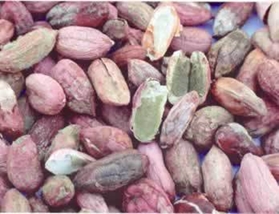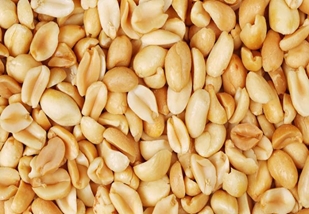Peanuts
|
|
Biotechnology offers solutions for Aflatoxins and Allergies
Peanuts, also known as groundnuts or goobers, are important to large and small farmers in tropical and temperate latitudes around the world. Valuable as both food and feed, peanuts are is prone to infection by fungal diseases that produce cancer causing residues. Genetic engineering offers a solution.
With global production of 44 million tonnes in 2014, peanuts are important as both a nutritious legume and a valuable oil crop (FAO Statistics at http://www.fao.org/faostat/en/#data/QC). Originating in South America approximately 8,000 years ago, indigenous people spread peanuts widely in the Americas and, after the Columbian exchange, around the world. Because of its many, varied derivatives peanuts are widely used in industrial nations in temperate latitudes, but it is an important dietary component and cash crop for millions of people in the tropics around the world (World Peanut Market: An overview of the past 30 years, https://athenaeum.libs.uga.edu/bitstream/handle/10724/12051/RB437.pdf?sequence=1; Plant Geneticist Cultivating a Future for Peanut Farming in Uganda, http://www.sciencemag.org/careers/2010/02/plant-geneticist-cultivating-future-peanut-farming-uganda).
Several species of mold from the genus Aspergillus are found throughout the world and infect many plants. These fungi produce toxic compounds known as mycotoxins which suppress mammalian immune systems and cause cancer of the mouth, esophagus, digestive tract, and liver (Aflatoxins, https://www.drthrasher.org/aflatoxins). These plant diseases are so widespread, and the safe levels in food are so low, that considerable human disease and food waste results. Some plants, however, produce their own defensive molecules, known as defensins, which protect against disease by suppressing fungal growth. Biotechnology researchers have taken genes encoding for the production of these defensins from resistant plants like alfalfa and clover, and transferred them into peanuts, protecting against the plant disease and the accumulation of the toxic residues (Peanuts that keep aflatoxin at bay: a threshold that matters, http://onlinelibrary.wiley.com/doi/10.1111/pbi.12846/abstract; Genetic engineering solves major toxin problem in peanuts, https://allianceforscience.cornell.edu/blog/genetic-engineering-solves-major-toxin-problem-peanuts). If successfully commercialized this could solve a serious food safety problem.
Peanuts are also one of the eight foods responsible for 90% of all food allergies, and is distinguished by being more allergenic overall than any of the others (Peanut Allergy, https://www.foodallergy.org/common-allergens/peanut). Researchers have identified two proteins responsible for most of the allergenicity observed from peanuts, as well as the genes encoding their production, which makes up approximately 10% of the total protein content in peanuts. They have used biotechnology to delete these genes encoding for the allergenic peanut proteins, resulting in a peanut that is vastly less allergenic, if not entirely safe for sensitive individuals to consume (Genetic engineering for removing food allergens from plants, https://www.researchgate.net/publication/5384841_Genetic_engineering_for_removing_food_allergens_from_plants). It is not clear, however, that an entirely allergy free peanut can safely be produced, even though the existing dangers can clearly be substantially reduced (Allergy-Free Peanuts? Not So Fast: CRISPR technology is being touted as a way to remove this ubiquitous food's deadly potential, but it won't be easy-if it's possible at all, https://blogs.scientificamerican.com/guest-blog/allergy-free-peanuts-not-so-fast/).
|
|
|







